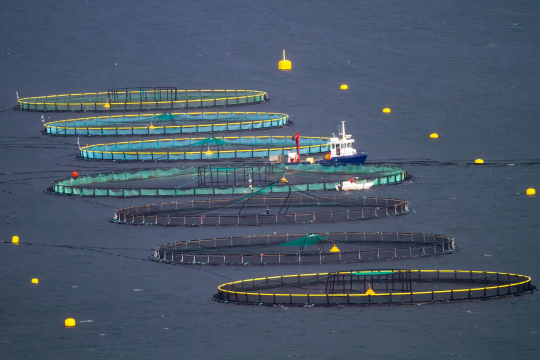Aquaculture, the fastest-growing food production technology, faces scrutiny over its environmental impact and social consequences. As the oceans' condition worsens and more species become endangered or extinct, aquaculture is overtaking fisheries as the main source of seafood for human consumption. A recent study offers insights into the sustainability of aquaculture.
Aquaculture is the breeding, raising, and harvesting of fish, shellfish, and aquatic plants, also known as farming in water. It can help restore habitats and provide livelihoods and protein sources for the world’s growing populations.
"Aquaculture is important as a source of income and supports food security to domestic populations in the Global South,” says Håkan Eggert, University of Gothenburg, one of the lead authors of the paper.
Environmental concerns
However, there are also concerns about the environmental sustainability of aquaculture, for instance, its impact on ecosystems, effects of pollution, antibiotics, and parasites as well as social impacts.
Lack of data has prevented systematic comparison of global aquaculture production systems. The Aquaculture Performance Indicators (APIs) provide a rapid, low-cost approach to overcome data scarcity. The APIs build on work with Fisheries Performance Indicators.
Provides valuable data
22 researchers, including EfD researchers Håkan Eggert, Carlos Chávez, Nnaemeka Chukwuone, and Byela Tibesigwa, have studied 57 aquaculture systems globally using those APIs.
The comprehensive study which encompasses 88 metrics, reveals significant variations in sustainability performance, highlighting where to aim policy measures and investment to reach sustainability objectives.
New insights about aquaculture
The study finds that freshwater and marine aquaculture are equal from a sustainability perspective. This challenges the preconceived notions that the former is more sustainable. It suggests that policy and investment should focus on improving sustainability outcomes regardless of which water body was used for production.
In addition, monoculture systems, on average, scored higher across the three pillars of sustainability (economic, social, and environmental) compared to polycultures. This finding contradicts the belief that polycultures, which integrate multiple species, optimize resource use and sustainability.
Performance varies between species
The study also compares the performance of key farmed species, such as salmon, tilapia, carp, shrimp, mollusks, and catfish. Filter-feeding mollusks, which do not require manufactured feeds, excel in environmental performance but lag in economic viability. In contrast, salmon scores well in most dimensions, reflecting the success of intensive, technologically advanced production systems. However, the high environmental costs associated with salmon farming, highlight the need for continued innovation and regulation to mitigate these impacts.
The study further reveals differences in sustainability outcomes between domestic and export-oriented aquaculture systems. In low-income countries, export-oriented systems outperformed domestic markets in environmental and economic performance. While, in high-income countries, domestic markets scored higher in environmental sustainability. These findings emphasize the need for nuanced policy and market strategies to enhance sustainability across different contexts.
Nigeria, one of the countries in the study, has practiced aquaculture for about 70 years and the industry has grown considerably since around 2000. Now it contributes to about 25% of the country's seafood production. Nnaemeka Chukwuone was leading the Nigerian research team.
“We had very little data on Nigerian aquaculture. Our API data gives us valuable information. Catfish and tilapia aquaculture, the dominating species in Nigeria, are doing well from economic and social perspectives, but we see that there are environmental challenges. Compliance with environmental regulation and the level of water effluents are two areas for improvement,” says Nnaemeka Chukwuone.
Guides policy and investments
The APIs provide a robust framework for assessing the sustainability of aquaculture systems, offering valuable insights for policy and investment decisions. The study underscores the potential for sustainable aquaculture production and the importance of continued data collection and analysis to drive improvements in the industry.
While the aquaculture industry faces significant challenges, the data suggests sustainable production is achievable. With the right policies and investments, aquaculture can continue to support livelihoods, food security, and environmental health globally.
The study titled Environmental, economic, and social sustainability in aquaculture: the aquaculture performance indicators is published in Nature Communications, and can be accessed here.
By: Cristóbal Vásquez and Petra Hansson
